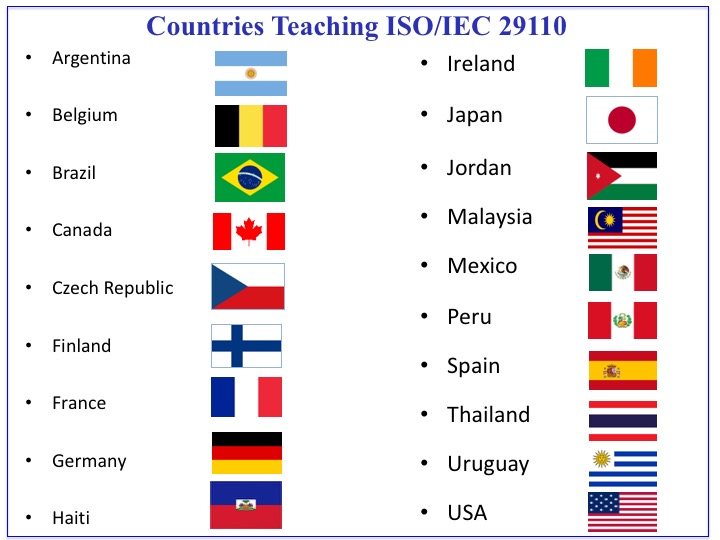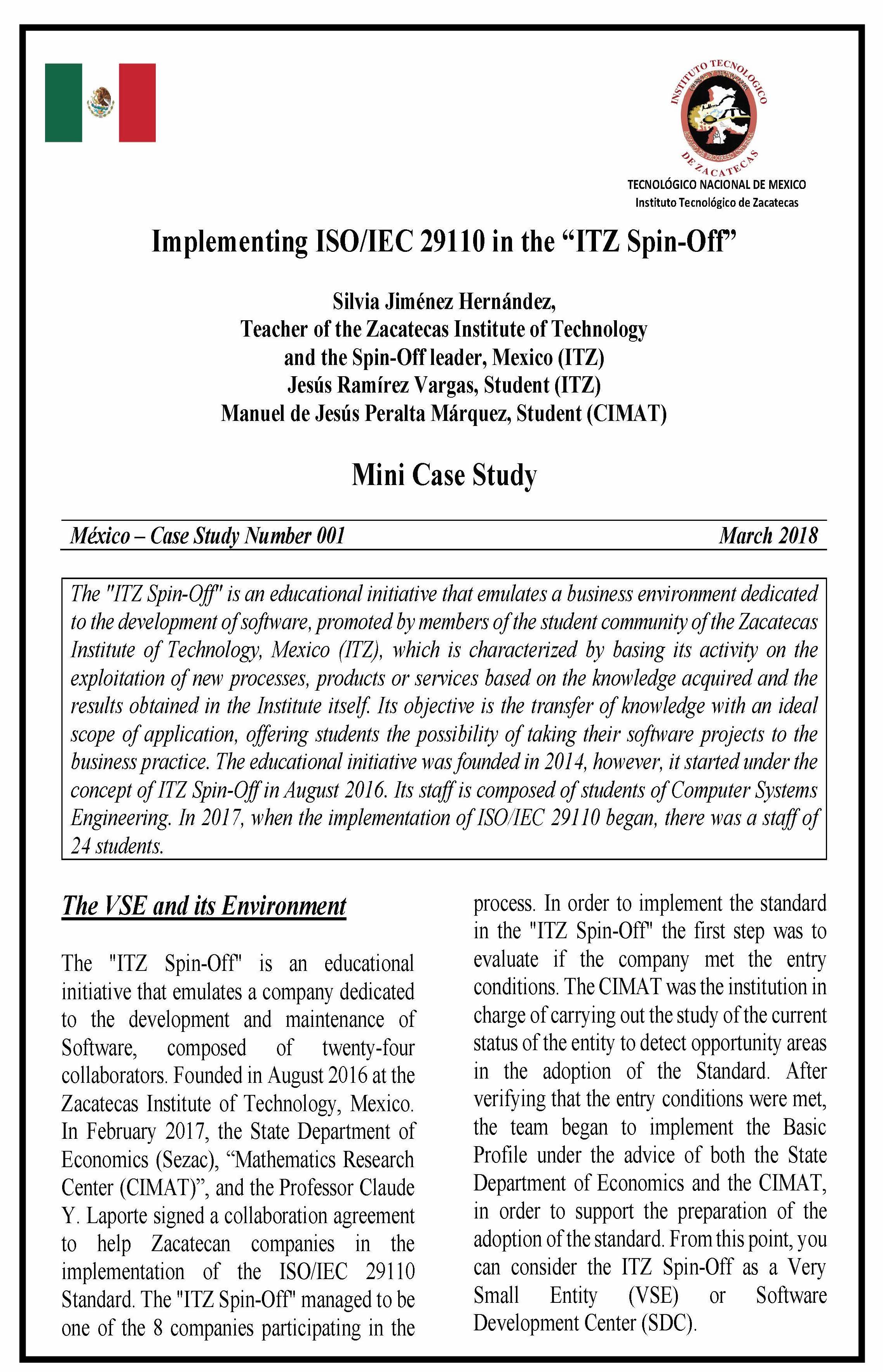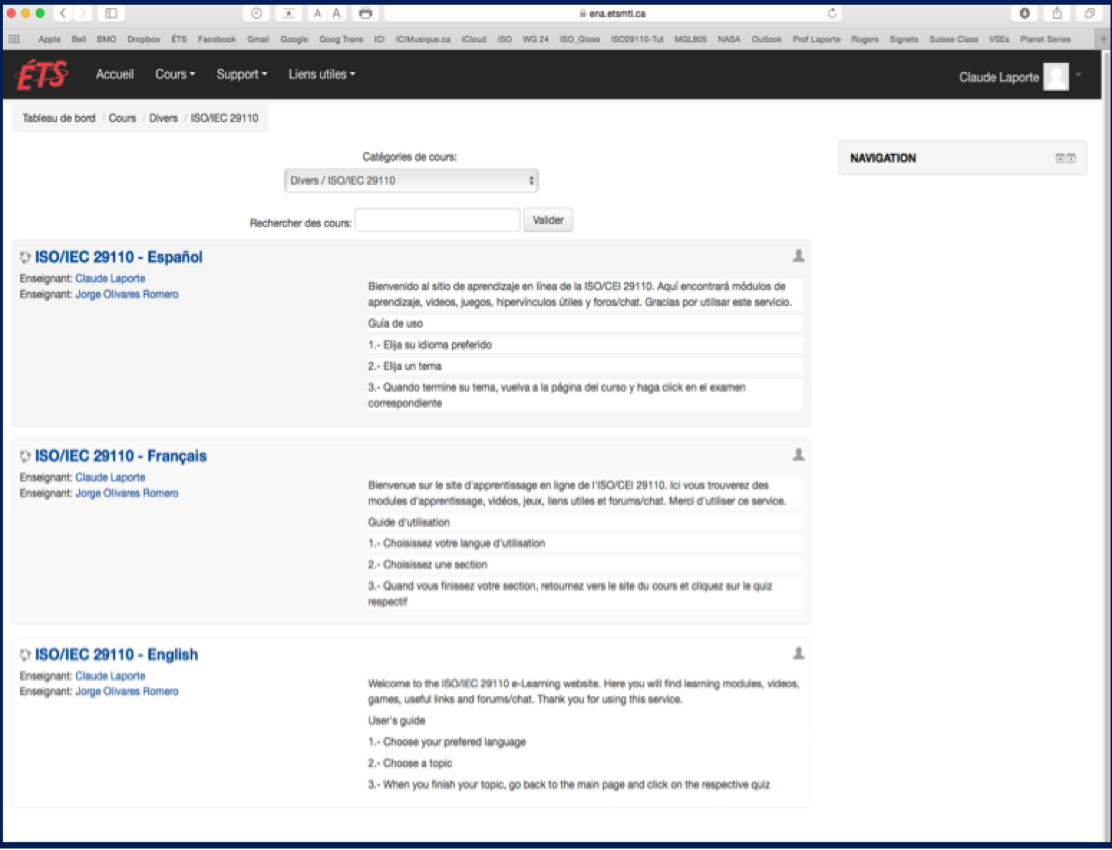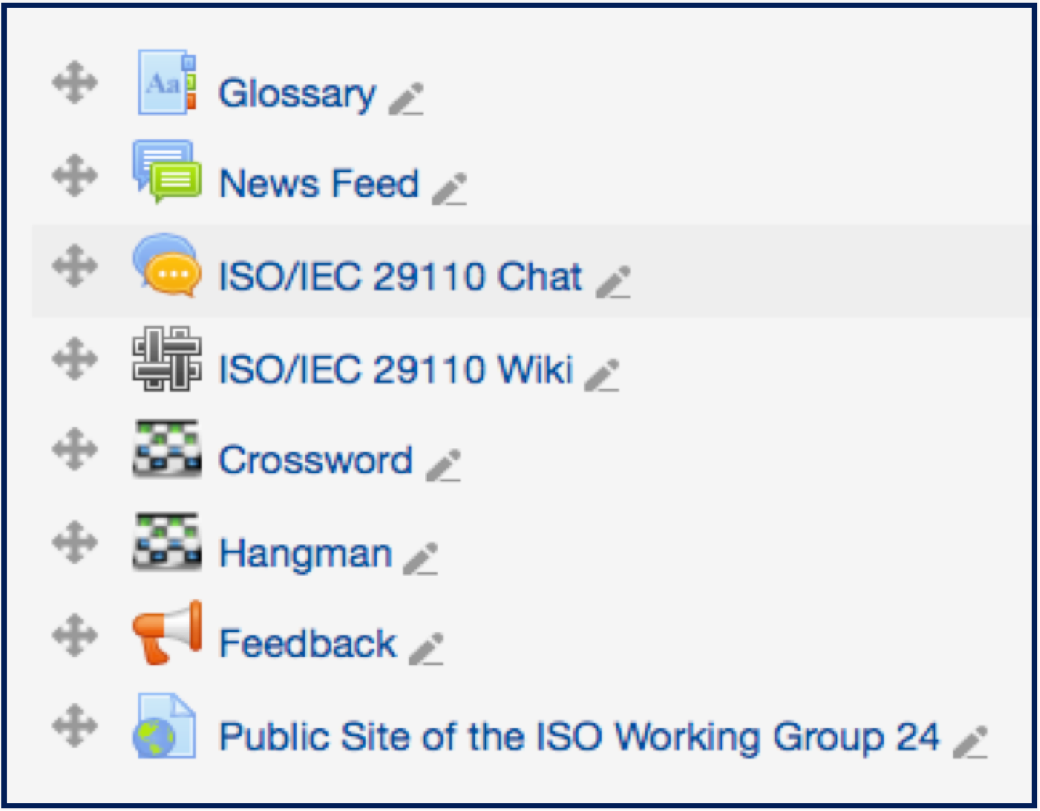
At Hyderabad (India), at the meeting of Working Group 24 in May 2009, it was proposed to establish an informal interest group about education. Its main objective is to develop a set of courses for software undergraduate and graduate students such that students learn about the ISO standards for Very Small Entities (VSEs) before they graduate.
The course modules developed are, for academia, similar to the development packages for VSEs. In this case, the objective is to facilitate the teaching of the new standards by academia by providing them with readily usable course plans, teaching material such as presentation material, exercises, case studies and reading material.



Course 1 - Introduction to ISO/IEC Software Engineering Standards
This course provides an introduction to the family of ISO/IEC Software Engineering Standards.
Background
Since software engineering cannot based upon physical principles or laws of nature as are most other engineering disciplines, the identification of proven practices and their publication, based upon consensus, as software engineering standards is fundamental to this discipline.This course provides the students with an introduction to the family of ISO/IEC Software Engineering Standards and describes the relationships between software engineering and systems engineering standards.
Learning Objectives:
- Present the advantages and disadvantages of standards,
- Explain why ISO/IEC software engineering standards were developed,
- Explain the portfolio of ISO software and systems engineering standards and the relationships between systems engineering and software engineering ISO/IEC standards,
- Explain the ISO 9001 standards and associated guide for IT (ISO/IEC 90003),
- Present the ISO/IEC/IEEE 12207 and ISO/IEC15504 standards.
Detailed Course DescriptionPresentation material
Additional material (e.g. exercises)
Course 2 - Introduction to the ISO/IEC 29110 Standards, Technical Reports and Deployment Packages for VSEs
This course explains why ISO/IEC Standards, Technical Reports and Deployment packages for VSEs were developed and what ISO/IEC standards and technical reports are available for VSEs.Background
An ISO/IEC set of Standards and Technical Reports has been developed for Very Small Entities (VSEs). A VSE is defined as an entity (enterprises, organizations, departments or projects) having up to 25 people. The majority of software entities fall within the VSE category. Industry recognizes the value of VSEs in contributing valuable products and services. VSEs also develop and/or maintain software that is used in larger systems; therefore, recognition of VSEs as suppliers of high quality software is required.
This course explains the justification and steps that led to the development of ISO/IEC 29110 set of Standards, Technical Reports and Deployment packages for VSEs as well as an Introduction to the set of documents.
Learning Objectives:
1. Understand the characteristics of VSEs and their problems and needs regarding standards;
2. Understand the requirements derived by the ISO Working Group to develop standards for VSEs;
3. Understand the strategy of the ISO Working Group to develop standards and guidelines for VSEs;
4. Understand the concept of Profiles and Standardized Profiles (SPs);
5. Understand the set of ISO/IEC 29110 standards and technical reports for the Generic Profile Group;
6. Understand the concept of Deployment Packages;
7. Understand the set of Deployment Packages of the Generic Profile Group;
Detailed Course Description
Presentation material
Additional material (e.g. exercises)
Course 3 – Development of a Software engineering Process using ISO/IEC TR 29110 Part 5 – Management and Engineering Guide
Background
Learning Objectives:
Detailed Course Description
Description
Presentation material
Additional material (e.g. exercises)
Course 4- Software Development Using ISO/IEC TR 29110 Part 5 - Management and Engineering Guide
Background
ISO/IEC 29110 standards and technical reports have been developed for Very Small Entities (VSEs), e.g. enterprises, organizations, departments or projects having up to 25 people.
This course uses an existing software development process for VSEs to develop a software component.
Learning Objectives:
Use Entry Profile or the Basoc Profile of ISO/IEC TR 29110-5 Management and Engineering Guide to develop a software component,
Use set of Deployment packages for the Generic Profile Group,
Evaluate the process and deployment packages used,
Propose improvements to deployment packages and ISO/IEC 29110 Part 5.
Detailed Course Description
Presentation material
Additional material
Laporte, C.Y., April, A., Software Quality Assurance in an Undergraduate Software Engineering Program, Proc. 2013 Canadian Engineering Education Association (CEEA13) Conf., Montréal, June 17-20, 2013.
- The paper describes a software quality assurance (SQA) course. The course includes a 10-week project in which teams of 4 students apply the SQA practices taught in class in a software development assignment using ISO/IEC 29110. The project is conducted in 6 phases: Project planning, Analysis and documentation of requirements, Software architecture and detailed design, Software construction, Software integration and tests, product delivery and project closure. The students collect measures throughout the 10-week period, and the performance of each team is analyzed.
Course 5- Self-Assessment of an ISO/IEC 29110-Based Software Process
This course will use the ISO/IEC 29110 Technical Report and Deployment Packages for VSEs to perform a self assessment of a software development process.
Background
Learning Objectives:
Detailed Course Description
Description
Presentation material
Additional material (e.g. exercises)
Course 6 – Deployment of ISO/IEC 29110 Standard in a VSE
This course uses the ISO/IEC TR 29110 Part 5- Management and Engineering Guide and Deployment Packages to deploy a process in a VSE.
Background
ISO/IEC 29110 standards and technical reports have been developed for Very Small Entities (VSEs). A VSE is defined, in ISO/IEC 29110, as an entity (enterprise, organization, department or project) having up to 25 people. The majority of software entities fall within the VSE category. Industry recognizes the value of VSEs in contributing valuable products and services. VSEs also develop and/or maintain software that is used in larger systems; therefore, recognition of VSEs as suppliers of high quality software is required.
Pilot projects are an important mean of reducing risks and learning more about the organizational and technical issues associated with the deployment of software engineering practices. A successful pilot project is also an effective means of building adoption of new practices by members of a VSE. This course explains the steps to select and conduct a pilot project in a VSE.
Learning Objectives:
1. Understand the characteristics of VSEs and their problems and needs regarding standards;
2. Understand the concept of Deployment Packages and the set of Deployment Packages of the Generic Profile Group;
3. Understand the concept of Pilot Project;
4. Understand the Pilot Project Deployment Package;
5. Understand the tasks to select and conduct a Pilot Project using the Deployment Package;
6. Propose improvements to the development process of a VSE;
Detailed Course Description


An Innovative Approach in Developing Standard Professionals by Involving Software Engineering Students in Implementing and Improving International Standards
One way to develop standards professionals is by having professional graduate students involved in the application and improvement of international standards. At the École de technologie supérieure (ÉTS), a 7,800-student engineering school of Montréal, International Software Engineering Standards are introduced and used in Software Quality Assurance and Software Process Improvement courses and industrial projects conducted by graduate professional software engineering and IT students. These 2 courses include an intervention where teams of students have to do a project with local organizations as well as tailoring International software engineering standards such as the new set of ISO/IEC 29110 standards and freely available guides targeted at very small enterprises and software development groups. Three projects, conducted by graduate professional students, i.e. graduate students working full time in an organization, using the new ISO/IEC 29110 are presented as well as a cost and benefit evaluation using a recently published ISO Methodology to assess the economic benefits of the implementation, in a Canadian engineering company, of the ISO/IEC 29110 standard.
Collaboration with a Peruvian university lead to the development of teaching material in Spanish and the implementation of the ISO/IEC 29110 standard in Peruvian small software enterprises. Also, collaborations between ÉTS and a Haitian university (INUQUA) lead to the teaching and deployment the ISO/IEC 29110 in VSEs of Haiti are presented.
A project to adapt the ISO/IEC 29110 to the teaching of software development in a technical college is discussed. Finally, we present the results of a study, conducted in Ireland, of attitudes, opinions and sentiment towards ISO/IEC 29110 that exist in commercial organizations, which shows support for the need to educate the next generation of standards professionals to embrace such standards initiatives.
- Laporte, C.Y., O'Connor, R., Garcia Paucar, L.H., Gerançon, B., An Innovative Approach in Developing Standard Professionals by Involving Software Engineering Students in Implementing and Improving International Standards, International Cooperation for Education about Standardization Conference, August 14th 2014, Ottawa, Canada.
- Laporte, C.Y., O’Connor, R.V., García, L., Gerançon, B., An Innovative Approach in Developing Standard Professionals by Involving Software Engineering Students in Implementing and Improving International Standards, Journal of the Society for Standards Professionals. 2015, Vol. 67, No. 2, p. 1-9.
Improving Project Management for Small Projects
This article presents a project, done by a software engineering graduate student of ETS, in a canadian engineering company.
A large Canadian engineering company has developed and implemented project management processes for their small-scale and medium-scale projects. The company was already using a robust project management process for their large-scale projects. The objectives of this process improvement project were to reduce cost overruns and project delays, standardize practices to facilitate the integration new managers, increase the level of customer satisfaction and to reduce risk-related planning deviations. For this improvement project, the engineering organization used the new ISO/IEC 29110 standards developed specifically for very small entities. An analysis of the cost and the benefits of the implementation of small and medium scale project management processes was performed using the ISO economic benefits of standard methodology. The engineering enterprise estimated that, over a three-year timeframe, savings of over 780,000$ would be realized due to the implementation of project management processes using the ISO/IEC 29110 standard.
- Laporte, C.Y., Chevalier, F., Maurice, J.-C., Improving Project Management for Small Projects, ISO Focus+, International Organization for Standardization, February 2013, pp 52-55.
- Laporte, C.Y., Chevalier, F., Development of Project Management Processes for Small-scale Projects in a large Engineering Company (Poster)
Development of a Social Network Website Using the Management and Engineering Guide of the ISO/IEC 29110 Basic Profile
Two software engineering graduate students used the Management and Engineering guide of the ISO/IEC 29110 Basic profile to manage and develop a website.
The article presents a software development project carried out by a two-person start-up enterprise.
The objective of the project was to develop a social networking website for travelers. The new ISO/IEC 29110 standard developed specifically for very small entities and start-ups was used to develop the software for a Web application to allow users to collaborate with all members of a network of friends, planning their trips and sharing the details in a simple and easily accessible way.
Managing this project and developing the software for it took about 1000 hours. Using proven software engineering practices set out in the ISO/IEC 29110 standard enabled the two-person team to plan and execute the project expending only 13 percent of the total project effort on rework (that is, wasted effort). About 9 percent of the total project effort was expended on prevention tasks and 6 percent on evaluation tasks, such as desk check peer reviewing and testing. The last section of this article presents lessons learned and a list of recommendations for future users of the ISO/IEC 29110 standard and guides.
- Laporte, C.Y., Hébert, C., Mineau, C., Development of a Social Network Website Using the New ISO/IEC 29110 Standard Developed Specifically for Very Small Entities, Software Quality Professional Journal, ASQ, vol. 16, no. 4., pp 4-25.
Presentation material
Additional material (e.g. exercises)
ISO/IEC 29110 Interactive Crossword
Crosswords can be produced using an open source tool available from: EclipseCrossword..com

|

|